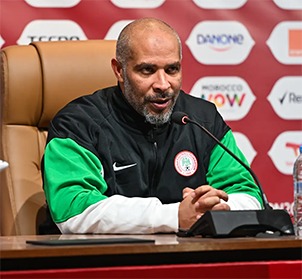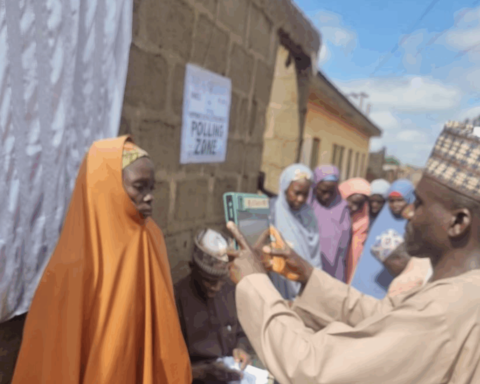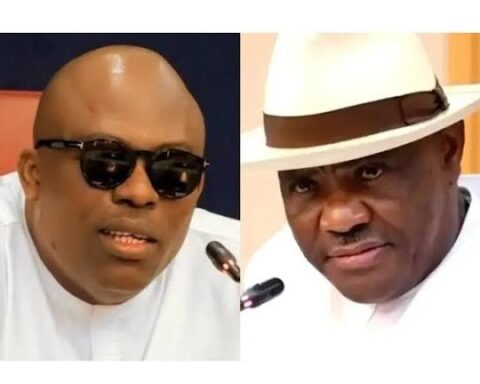-
As Governor of Lagos State, Bola Ahmed Tinubu (BAT), now President of the Federal Republic, was, at a point in his governorship, widely acclaimed for his famous call for fiscal federalism, a revenue generation and sharing arrangement whereby states and or zones or regions, would earn and keep for themselves greater chunks of the revenue generated from the economic activities within their domains. In this week’s HARD BEAT, FELIX OGUEJIOFOR ABUGU reports that as President, Bola Tinubu, not often seized of altruistic exertions, seems bent on giving Lagos its ‘due’, which he could not do as Governor, using so-called national tax reforms as cover.
On the surface, the debate on President Bola Tinubu’s controversial tax reform would appear to highlight one of Nigeria’s steadfastly held national assumptions, even exposing our seemingly unbridgeable fault-lines: namely, that the North leeches off the rest of the country and is ever loathe to pay its bills.
That assumption may have been given more traction by the fact that most of the vociferous attacks on the tax bills have come from the northern part of the country, with many significant voices from the region charging that the bills are Tinubu’s new pauperization weapon against the North.
First to shoot down the bills was the Bala Mohammed-led Northern Governors Forum/Northern Elders Forum. Rising from an expanded meeting of the Governors and traditional rulers and other northern stakeholders in Abuja on 28th of last month – Monday, October 28, to be precise – the Governors/Northern Elders said they were “dismayed by the contents of the recent Tax Reform Bills that were forwarded to the National Assembly.”
“The contents of the bills go against the interests of the north and other sub-nationals, especially the proposed amendment to the distribution of Value Added Tax (VAT) on a Derivation-based Model,” they said.
“This is because companies remit VAT using location of their headquarters and tax office and not where the services and goods are consumed. In view of the foregoing, the Forum unanimously rejects the proposed Tax Amendments and calls on members of the National Assembly to oppose any bill that can jeopardise the well-being of our people.”
Since then, a deluge of other critical voices against the tax bills has come from the North.
In a statement on October 30, barely two days the Elders’ meeting and communique, APC’s enfant terrible and Senator representing Southern Borno, Senator Ali Ndume, not only aligned with the stand of Northern Governors/ Elders’ Forum on the controversial bills but also rejected even the idea of tax reforms at all, at this point in time.
For him, the federal government must get things right first, expand sources of income for Nigerians and ensure that the people are “living and not surviving, before reviewing taxes upward.”
Lamenting that “the middle class of the country is gradually fading, as they are being squeezed out by high inflation,” the vocal former Senate Leader said: “This tax they’re talking about, we are almost losing the middle class in Nigeria. It is either you have it or you do not have it. Those that are in the middle are being squeezed out. If Nigerians can pay those taxes, it is okay.
“But in the current situation, increasing taxes is not an alternative at all. I will not support any tax increase.
“Let us get things right first. Let people start living and not survive. Let people have extra income, and then you can tax them. I like to use an example of common sense. Allow Nigerians to have enough blood in their body before you start asking for donation.”
Criticisms of the tax bills by Northern Elders’ Forum, Ndume and other stakeholders were to reach a denouement when on the 1st of this month, that is, November 1, 2024, the National Economic Council (NEC) presided over by Vice President Kashim Shettima, ostensibly buckling under pressure from the North, recommended that the president withdraw the bills from the National Assembly for more consultations and possible twerking before representing them.
Governor Seyi Makinde who addressed State House correspondents after the meeting, said the recommendation formed part of the resolutions reached at the 144th meeting of NEC, explaining that the council agreed that the withdrawal had become necessary in view of the need to allow for consensus building and better understanding of the bills by Nigerians before being presented to NASS for consideration and eventual passage into law.
He said: “NEC today took a presentation from the Chairman of the Presidential Committee on fiscal policy and tax reforms. Their main focus is fair taxation, responsible borrowing and sustainable spending.
“The Council acknowledged that the country is underperforming on all indices as regards huge major revenue sources, also tax to GDP ratio and so on.
“So, after extensive deliberation, NEC noted the need for sufficient alignment between and amongst the stakeholders for the proposed reforms.
“Council, therefore, recommend the need to withdraw the bills currently before the National Assembly on tax reforms so that we can have wider consultations and also build consensus around these reforms for the benefit of the entire country, and also to give people (more information about the bills) for them to know the vision and where we are moving the country in terms of a tax reforms, because there’s really a lot of miscommunication, misinformation…
“So, the bills will be drawn from the National Assembly and then there will be consultations afterwards.”
The Nigerian National Economic Council (NEC) is comprised of the Vice-President as Chairman; the 36 State Governors; Governor of the Central Bank of Nigeria (CBN), Minister of finance, Secretary to the Government of the Federation (SGF) and other government officials and agencies whose duties are related to the economy, as members.
It is instructive that weighty and wise as their voice on the nation’s economic matters would appear, their recommendation on the controversial tax bills was outrightly ignored by President Tinubu, who insisted on the bills being considered as drafted, by the National Assembly, apparently banking on his alleged grip on the leadership of the legislature, to have his way.
However, as sure as the sun always rising from the East, Tinubu’s refusal to withdraw the controversial bills has courted more scurrilous attacks on both the bills and the president’s seeming lack of altruism in the packaging and presentation of the bills to the National Assembly, many openly questioning his motive behind these bills. Is this all about patriotism and country? In whose interest would Tinubu refuse to tinker with tax reforms bills the National Council (NEC) considers not good enough for the country?
Why does it not matter to the president that where it was hitherto only cleverly insinuated, it is now being openly voiced, with daggers clearly drawn, that ‘Tinubu is using tax reforms as a pauperization weapon against the North?’
The anger in the north against the bills is, indeed, palpable. In a report published yesterday (Monday, November 18) by Daily Query, the Deputy House Spokesman, Hon. Godwin Agbese from Benue State was quoted as saying that many Reps are under pressure by their State Governors not to support the bills or risk losing their return tickets to NASS come the 2027 election. Indeed, the current situation is that any Rep or Senator seen speaking in favour of the bills or whose body language is seen as favouring the bills, is instantly pelted in the North. As was widely reported, this second round of attacks on the bills came to a head yesterday (Monday, November 18) with NNPP National Leader and former Kano Governor, Senator Rabiu Kwakwanso claiming that Lagos (read Tinubu) is “working hard to colonize Kano and, indeed, the entire North with the tax reform bills.”
“Today, we are aware that the Lagos young men are working so hard to impose taxes and take away our taxes from Kano and this part of the country to Lagos,” Kwankwaso lashed out.
“Even the telephones that we make or register here in Kano, efforts are there to take all the taxes to Lagos. Even our sons and daughters who have brought factories, many of them here in Kano and northern Nigeria, and even banks, somehow, they are forced to take their headquarters to Lagos because taxes will now have to go to Lagos.”
And so, we ask: while the North may appear to have been more quickly discerning of the deleterious effects of aspects of the bills on its regional interests in political Nigeria as cried out more vociferously, would that mean that only the north has been given the short end of the stick in the controversial proposed legislation? The answer is, of course, no.
In point of fact, inherent in the 36 State Governors’ opposition to the bills is the assumption (still unchallenged) that all, or at least most, of the 17 Southern State Governors are opposed to the bills. Add to that the fact that the NEC resolution on the proposed legislation was disclosed to State House Correspondents by Governor Seyi Makinde of Oyo State, who carried out that assignment with some gusto and seemed quite excited by the NEC resolution.
Against the backdrop of Tinubu’s inexplicable refusal to heed the advice of the nation’s highest economic advisory team, the NEC, on the tax bills, a lot of insights are now coming out, which show that, apart from Lagos and Ogun (or perhaps even the South West), practically every other State, zone, region or group has seen that they stand to gain little or nothing from the tax reforms as proposed by the president, and is no longer keeping quiet.
The aspect of the bills in relation to VAT, for instance, that riles both the North and South, outside Lagos, is Tinubu’s insistence on tax DERIVATION instead of tax ATTIBUTION to area of collection, as the determinant of who takes the bigger percentage of the VAT paid. Why did Oyedele, Tinubu’s tax czar and a member of the Lagos crowd, reverse the two positions, if not to confer on Lagos undue advantage over the rest of the country?
“Let us take VAT as an example,” says a tax expert in a social media post sighted by Daily Query. “VAT is the tax charged on consumption of goods and services. By the reform bills, 60% of the VAT will go the state of collection. This sounds attractive right? But see where the problem is. I will use First bank, MTN and Chicken Republic as case studies.
“First Bank: The registered address of First Bank in CAC or FIRS is 35 Marina Lagos. However, First Bank has 15 branches in Anambra State. In the course of rendering bank services, First Bank collects VAT from its branches. But going by the reform bills before NASS, the VAT collected from the 15 branches of First Bank in Anambra is credited to Lagos because it is the registered office of First Bank. Thus, if First Bank collects N500m as VAT from Anambra, 60% of it under derivation will go to Lagos. And this is replicated in the other States in Nigeria.
“MTN has its registered office in Lagos. But as at 2021, it had about 3m voice subscriptions in Anambra State. MTN collects VAT from the telecom services rendered to about 3m subscribers in Anambra on a daily basis. Let’s say it collects N700m monthly from Anambra subscribers. MTN would credit this amount collected in Anambra to Lagos State. And by the reform bill, Lagos will collect 60% of it.
“Now apply the principle to all the banks, breweries and mineral water bottling companies and you would be able to understand what the tax reform bills plan to do.”
Is there still any doubt as to the relevance of Kwankwaso’s fears? While Chairman, Presidential Committee on Fiscal Policy and Tax Reforms, Taiwo Oyedele’s denial yesterday at the House hearing on the bills, that the tax bills are aimed at undermining any section of the country, and that they are “aimed at enhancing efficiency and ensuring equity among States in the sharing of Value Added Tax (VAT)” may be in order, it flies in the face of this cryptic analysis of one of the bills’ implications by the tax expert. Whose VAT-sharing equity are the bills actually protecting?
“Any solution? Yes!” says our tax expert. “The proper thing, as it is done everywhere in the world and should be done in Nigeria, is what we call TAX ATTRIBUTION TO THE AREA OF COLLECTION. It is after tax attribution that you now talk about derivation. Using the above scenarios of First bank and MTN, the VAT collected by FIRS from the 15 branches of First Bank in Anambra will be credited to Anambra State account with FIRS. That is tax attribution to area of consumption. Also, the VAT collected by MTN from the 3m subscribers in Anambra will be credited to the Anambra account with FIRS. And by the new bill, 60% of collections from MTN and First Bank in Anambra will now be given to Anambra by way of derivation. This principle should be applied in all the States of the federation.”
“This is what we mean by tax attribution to the area collected before derivation. The tax reform bill must include proper attribution of tax to areas of collection before derivation or else, it will become extortion of other States and or zones for the sake of Lagos,” he surmised.
It is now becoming clearer by the day why President Bola Ahmed Tinubu (PBAT) is bent on running Nigeria surrounded by his Asiwaju-or-death Lagos crowd, and running the country as if it were another Alimosho LGA. It is not about country or patriotism or creative nation-building. It is, has always been and will always be about fattening the Lagos cash-cow, even if it means pauperizing the rest of us, and milking it to his heart’s content.
Well, these bills must be killed!



























